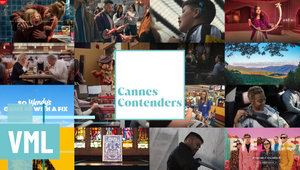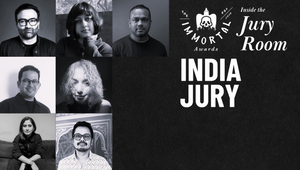
DE&I: Accelerating Change with Jyoti Mahendru

Improving the diversity, equity and inclusion of the advertising industry is a global challenge with local nuances. Jyoti Mahendru is chief people officer at Wunderman Thompson South Asia and she’s been spearheading change across the region for the network. Representation of women remains a key area of concern regionally, but the diversity and inclusion conversation has been broadening out to include tackling ableism, celebrating neurodiversity and supporting and empowering the LGBTQ+ communities
With over two decades of HR experience, Jyoti has been a key member of the Wunderman Thompson South Asia leadership team and has partnered with senior stakeholders to provide overall HR leadership to the organisation and collaborated in helping the organisation meet its strategic goals. She has extensive experience in developing HR frameworks across companies at different life cycles with multiple cultural and thought processes. She has actively represented the India market in global diversity coalitions & APAC Women Leadership groups in her various corporate assignments.
Jyoti is very clear that meaningful change won’t come from one-off initiatives but from consistency and commitment. She’s also very clear on the business reasons for taking DE&I seriously, something she’d like to see better understood across the industry.
LBB> What drew you to the field of DE&I?
Jyoti> My nephew has autism and having a family member with special needs drew me to this field. The limited awareness and hence limited acceptability of individuals with different needs was an eye-opener.
LBB> Before it became your job role, what was your specialism? And how did you get involved?
Jyoti> I have always been in HR and while I have been involved in DE&I initiatives for my organization for a long time now, I would still not call it my specialisation. I got involved in this area willingly and with a view to contribute and make a difference, even if it was small.
LBB> There’s a lot of frustration around the industry’s glacial pace when it comes to improving DE&I across all sorts of axes. What’s getting in the way?
Jyoti> What gets in the way is limited awareness, and very little acceptability for anyone who we consider 'different' in any way. The person could be different in terms of abilities, orientation, religion, small town versus big cities background and exposure, economic backgrounds, and exposure, so on and so forth. The change is slow because there are no perceived compelling reasons for this change.
LBB> Outside of the advertising industry, where do you see examples of large-scale meaningful progress (if at all), and what should our industry learn from it?
Jyoti> The retail industry and fashion industry have very diverse workforces. One often sees mute individuals at cash tills at large retail stores, coffee chains, etc, which is very heartening. Equally encouraging is the high numbers of LGBTQ+ individuals in the fashion industry.
LBB> The dimensions of DE&I can differ somewhat according to geographic/cultural context - I’m curious, where you’re based, what are the big issues or most urgent elements of DE&I that you need to address? (And if your role covers more than one market/territory, how do you and your team navigate the local nuances while having a cohesive and consistent set of values?)
Jyoti> So I am based in Delhi/NCR and I look after the South Asia market. The most common challenge in this geography is still gender balance. Women still form less than 35-40% of the workforce and that too at junior-mid level. Sometime around the time that they reach mid-level in careers, they are either getting married or becoming mothers. In a lot of such cases, these become the most common reasons for them to leave their careers and focus on other aspects of life. Very few stay in their jobs and grow in their careers. So the first challenge is to increase the representation of women in leadership roles.
The second challenge is acceptance of LGBTQ+ or differently abled individuals in the regular workforce. Even today, there are very few offices that are built to accommodate PwD or jobs that are seen as fit for special needs individuals. LGBTQ+ individuals don’t face these issues but they go through acceptance problems. They are often not taken an with equal level of seriousness and hence sometimes overlooked for higher levels of responsibilities.
LBB> In your role, what have been some of the most meaningful projects or policies you’ve been involved in regarding DE&I?
Jyoti> In my last organisation, I worked extensively on neurodiversity. We partnered with a Delhi based NGO, and offered internships to Autistic individuals in our agencies. We further strengthened the program by offering full-time employment to some of these individuals, who were keen to take up full time career opportunities.
The NGO ran sensitisation workshops for our teams who had to interact and work with these individuals. They were trained on do’s and don'ts and effective ways of sharing instructions. It was an outstanding experience for all of us who were involved.
I have also worked on including LGBTQ+ individuals in our teams. We included the same gender partners as family in employee health insurance policies, we organized fireside chats with LGBTQ+ individuals to share their challenges in order to sensitise our workforce and create awareness amongst them.
LBB> What role are clients playing in holding agencies accountable and driving better DE&I? Is this something you are seeing or would like to see more of?
Jyoti> The concept of DE&I is still limited to Gender diversity in most situations. We often saw only that information being sought in RFPs until a few years ago. However, now the concept is becoming wider, as it should be, and we normally report on more parameters than just the Women:Men ratio.
LBB> We often see DE&I siloed or pigeonholed as an HR issue - what’s the key to ensure that it’s embraced as an agency-wide or industry-wide responsibility?
Jyoti> There’s never been a greater urgency for workplaces to have an open and inclusive culture. A failure to adopt DE&I policies can lead to higher turnover, decreased engagement and productivity, and possible litigation.
Most companies have a long way to go when it comes to DE&I and one-off “initiatives” do not effectively address long-standing disparities. That is why it is important for leaders to infuse D&I throughout their organizations and develop strategies that can turn DE&I into an improved employee experience and a strategic advantage for the enterprise. From top management championing DE&I efforts, to holding them accountable for driving DE&I outcomes, inclusivity must be driven from top down.
Organisations need to engage, support, and educate leaders on how to use the DE&I agenda to drive change. It should be a core ingredient in the design and execution of business strategy and embedded in the activities of the organization day in, day out. Redesigning recruitment processes and hiring policies to understand which ones are limiting and mitigating systemic biases that can creep in unintentionally. Pivot from diversity training to leadership development coaching as diversity training is most effective when it’s part of an enterprise-wide strategic approach, includes both awareness and skills development, and is conducted over time. These approaches should help ensure that all employees understand their company’s IE&D goals and the journey that the company has embarked on thereby increasing their commitment to it.
LBB> What are your thoughts about where accessibility fits in the DE&I agenda?
Jyoti> The scale of the change needed is so massive that individuals can often feel powerless without the levers to move huge structures.
LBB> If you’d like our readers to take one thing away from this interview what would it be?
Jyoti> Organisations that include us are moving in the right direction, but change takes time, and one can't expect a complete overhaul overnight. We need to be patient, persistent and stick to our resolve that we need to keep going, keep learning and keep trying, because in the end, it will be worth it.















